七年级下册英语译林版知识点unit1
- 格式:docx
- 大小:37.12 KB
- 文档页数:5
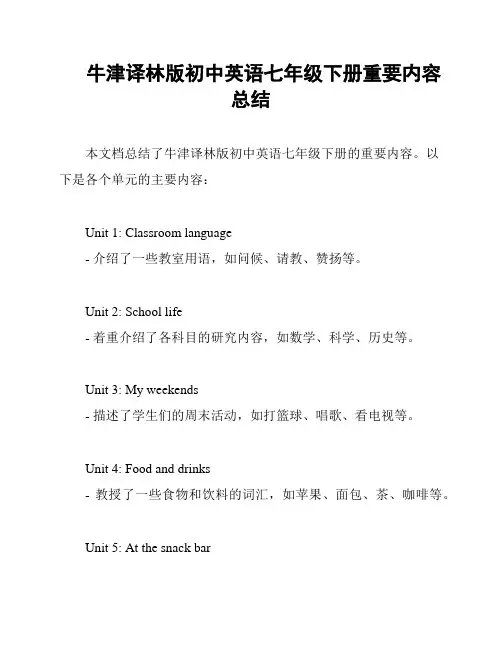
牛津译林版初中英语七年级下册重要内容
总结
本文档总结了牛津译林版初中英语七年级下册的重要内容。
以
下是各个单元的主要内容:
Unit 1: Classroom language
- 介绍了一些教室用语,如问候、请教、赞扬等。
Unit 2: School life
- 着重介绍了各科目的研究内容,如数学、科学、历史等。
Unit 3: My weekends
- 描述了学生们的周末活动,如打篮球、唱歌、看电视等。
Unit 4: Food and drinks
- 教授了一些食物和饮料的词汇,如苹果、面包、茶、咖啡等。
Unit 5: At the snack bar
- 研究了在小吃店点餐的常用句型,如“What would you like?”、“Here you are.”等。
Unit 6: Festivals and celebrations
- 介绍了一些重要的节日和庆祝活动,如春节、圣诞节、生日等。
Unit 7: Hobbies
- 研究了各种爱好和运动,如阅读、游泳、踢足球等。
Unit 8: At the zoo
- 通过描述动物的外貌和生活性,使学生了解不同的动物种类。
Unit 9: My body and health
- 关注了身体部位和健康问题,如头、肚子、感冒、发烧等。
Unit 10: My family
- 描述了家庭成员的关系和工作,如爸爸、妈妈、姐姐、弟弟等。
这些是牛津译林版初中英语七年级下册的重要内容总结。
希望能对您有所帮助!。
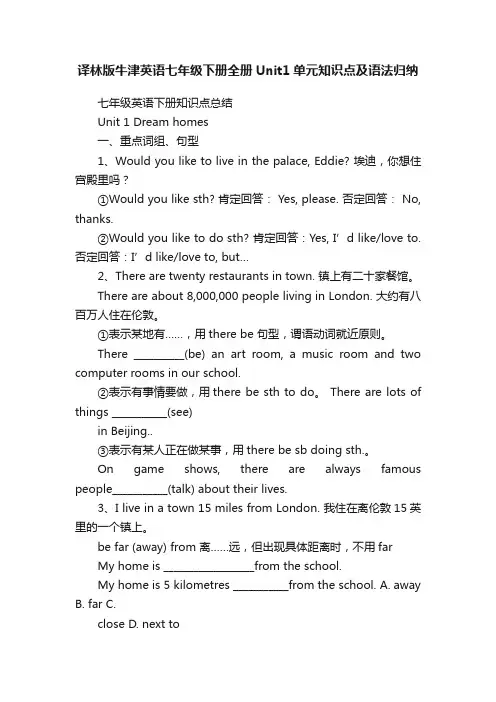
译林版牛津英语七年级下册全册Unit1单元知识点及语法归纳七年级英语下册知识点总结Unit 1 Dream homes一、重点词组、句型1、Would you like to live in the palace, Eddie? 埃迪,你想住宫殿里吗?①Would you like sth? 肯定回答: Yes, please. 否定回答: No, thanks.②Would you like to do sth? 肯定回答:Yes, I’d like/love to. 否定回答:I’d like/love to, but…2、There are twenty restaurants in town. 镇上有二十家餐馆。
There are about 8,000,000 people living in London. 大约有八百万人住在伦敦。
①表示某地有……,用there be 句型,谓语动词就近原则。
There __________(be) an art room, a music room and two computer rooms in our school.②表示有事情要做,用there be sth to do。
There are lots of things ___________(see)in Beijing..③表示有某人正在做某事,用there be sb doing sth.。
On game shows, there are always famous people___________(talk) about their lives.3、I live in a town 15 miles from London. 我住在离伦敦15英里的一个镇上。
be far (away) from 离……远,但出现具体距离时,不用farMy home is __________________from the school.My home is 5 kilometres ___________from the school. A. away B. far C.close D. next to4. have fun with sb./sth. 和某人/某物玩得开心have fun doing sth. 做某事很开心have(has/had) fun= have(has/had) a good time= enjoy(enjoyed) onself(myself/yourself/youselves……)5、I also have a bedroom of my own. =I also have my own bedroom. 我也有自己的房间。
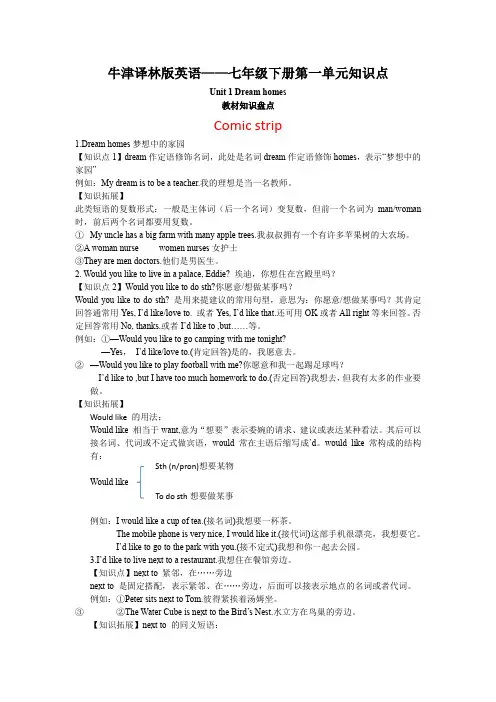
牛津译林版英语——七年级下册第一单元知识点Unit 1 Dream homes教材知识盘点Comic strip1.Dream homes 梦想中的家园【知识点1】dream 作定语修饰名词,此处是名词dream 作定语修饰homes ,表示“梦想中的家园”例如:My dream is to be a teacher.我的理想是当一名教师。
【知识拓展】此类短语的复数形式:一般是主体词(后一个名词)变复数,但前一个名词为man/woman 时,前后两个名词都要用复数。
① My uncle has a big farm with many apple trees.我叔叔拥有一个有许多苹果树的大农场。
②A woman nurse -------women nurses 女护士③They are men doctors.他们是男医生。
2. Would you like to live in a palace, Eddie? 埃迪,你想住在宫殿里吗?【知识点2】Would you like to do sth?你愿意/想做某事吗?Would you like to do sth? 是用来提建议的常用句型,意思为:你愿意/想做某事吗?其肯定回答通常用Yes, I’d like/love to. 或者Yes, I’d like that.还可用OK 或者All right 等来回答。
否定回答常用No, thanks.或者I’d like to ,but……等。
例如:①—Would you like to go camping with me tonight?—Yes , I’d like/love to.(肯定回答)是的,我愿意去。
② —Would you like to play football with me?你愿意和我一起踢足球吗?---I’d like to ,but I have too much homework to do.(否定回答)我想去,但我有太多的作业要做。
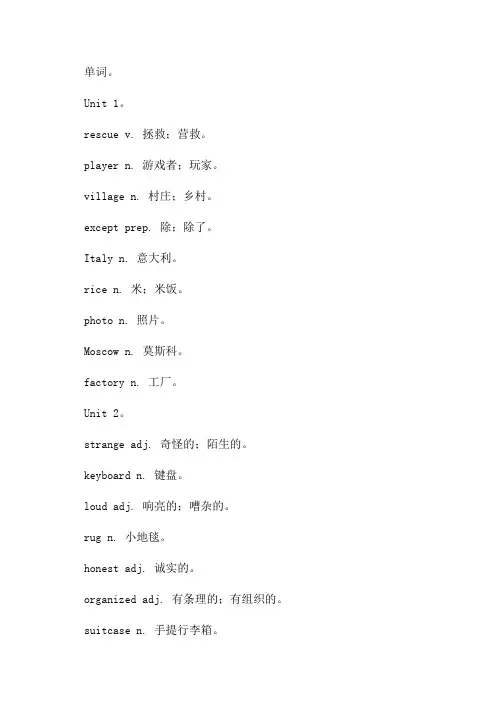
单词。
Unit 1。
rescue v. 拯救;营救。
player n. 游戏者;玩家。
village n. 村庄;乡村。
except prep. 除;除了。
Italy n. 意大利。
rice n. 米;米饭。
photo n. 照片。
Moscow n. 莫斯科。
factory n. 工厂。
Unit 2。
strange adj. 奇怪的;陌生的。
keyboard n. 键盘。
loud adj. 响亮的;嘈杂的。
rug n. 小地毯。
honest adj. 诚实的。
organized adj. 有条理的;有组织的。
suitcase n. 手提行李箱。
fireplace n. 壁炉。
mirror n. 镜子。
Unit 3。
wealth n. 财富;财产。
exchange v. 交换;交流。
mainly adv. 主要地;大体上。
capital n. 首都。
cartoon n. 动画片;卡通片。
tourist n. 旅行者;观光客。
meal n. 一餐;一顿饭。
climate n. 气候;气候条件。
Unit 4。
usual adj. 通常的;平常的。
except for 除…以外。
accident n. 事故;意外的事。
package n. 包裹;一包。
already adv. 已经。
gallon n. 加仑;八加仑。
top v. 高于;超过。
citizen n. 公民;市民。
Unit 5。
spend v. 花费;度过。
unhappy adj. 不快乐的;不幸的。
terrible adj. 可怕的;糟糕的。
star n. 星星;明星。
tablecloth n. 桌布;桌巾。
hide v. 藏;躲藏。
doorway n. 门口;门厅。
conclusion n. 结论;推论。
Unit 6。
depending on 取决于。
correctly adv. 正确地;准确地。
improve v. 改善;增进。
weak adj. 虚弱的;无力的。
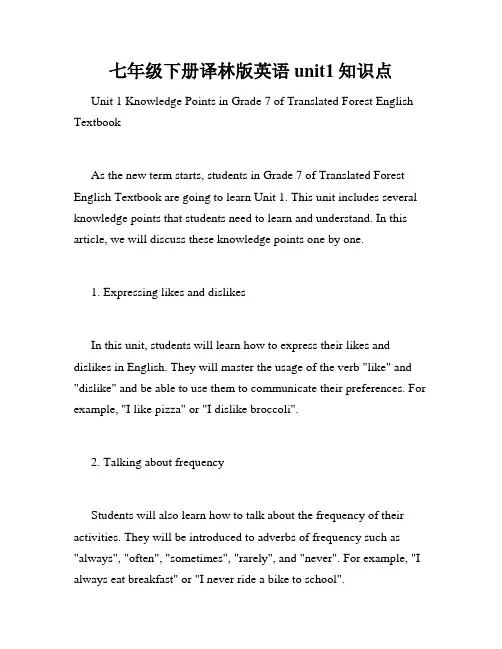
七年级下册译林版英语unit1知识点Unit 1 Knowledge Points in Grade 7 of Translated Forest English TextbookAs the new term starts, students in Grade 7 of Translated Forest English Textbook are going to learn Unit 1. This unit includes several knowledge points that students need to learn and understand. In this article, we will discuss these knowledge points one by one.1. Expressing likes and dislikesIn this unit, students will learn how to express their likes and dislikes in English. They will master the usage of the verb "like" and "dislike" and be able to use them to communicate their preferences. For example, "I like pizza" or "I dislike broccoli".2. Talking about frequencyStudents will also learn how to talk about the frequency of their activities. They will be introduced to adverbs of frequency such as "always", "often", "sometimes", "rarely", and "never". For example, "I always eat breakfast" or "I never ride a bike to school".3. Count and non-count nounsCount and non-count nouns are important for English grammar. In this unit, students will learn how to distinguish between count and non-count nouns and use them correctly. They will also learn how to use words like "some" or "any" with these nouns. For example, "I need some salt" or "I don't have any friends".4. Talking about hobbiesHobbies are common topics in English conversation. In this unit, students will learn how to talk about their hobbies and the activities they enjoy doing in their free time. They will use the present simple tense to describe their hobbies. For example, "I play basketball every weekend" or "I love reading books at home".5. Making invitationsMaking invitations is an important skill in English communication. Students will learn how to make invitations using the verb "let's". Forexample, "Let's go to the park together" or "Let's watch a movie tonight".6. Talking about schedulesIn this unit, students will learn how to talk about schedules and events using the present simple tense. They will be able to talk about routines and make plans. For example, "I have English class every Tuesday" or "I am going to the beach next weekend".In conclusion, Unit 1 of Translated Forest English Textbook for Grade 7 includes several important knowledge points. Students will learn how to express likes and dislikes, talk about frequency, distinguish between count and non-count nouns, talk about hobbies, make invitations, and talk about schedules. These knowledge points are essential for students to communicate effectively in English.。
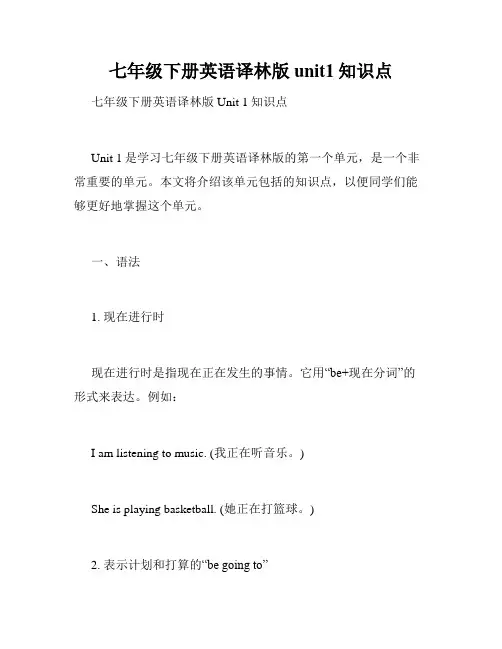
七年级下册英语译林版unit1知识点七年级下册英语译林版Unit 1知识点Unit 1是学习七年级下册英语译林版的第一个单元,是一个非常重要的单元。
本文将介绍该单元包括的知识点,以便同学们能够更好地掌握这个单元。
一、语法1. 现在进行时现在进行时是指现在正在发生的事情。
它用“be+现在分词”的形式来表达。
例如:I am listening to music. (我正在听音乐。
)She is playing basketball. (她正在打篮球。
)2. 表示计划和打算的“be going to”“be going to”是表示计划和打算的一种语法形式。
例如:I am going to study hard. (我打算好好学习。
)They are going to travel to Japan next month. (他们下个月将去日本旅游。
)3. 名词所有格名词所有格表示所属关系,一般在名词后面加上“’s”或“’”。
例如:This is my sister’s book. (这是我妹妹的书。
)The boy’s hat is blue. (这个男孩的帽子是蓝色的。
)二、生词本单元生词如下:1. twice (adv.) 两次2. go (v.) 去3. grandmother (n.) 祖母4. grandfather (n.) 祖父5. uncle (n.) 叔叔6. aunt (n.) 阿姨7. cousin (n.) 堂兄弟姐妹8. seem (v.) 似乎9. must (v.) 必须三、知识点详解1. 四会单词本单元的四会单词包括“twice”和“go”。
学生们应该熟练掌握这些单词的含义、用法以及拼写。
2. 家庭成员本单元重点介绍了家庭成员的词汇,比如“grandmother”、“grandfather”、“uncle”、“aunt”和“cousin”。
学生们应该能够熟练掌握这些词汇并且能够正确地运用它们。
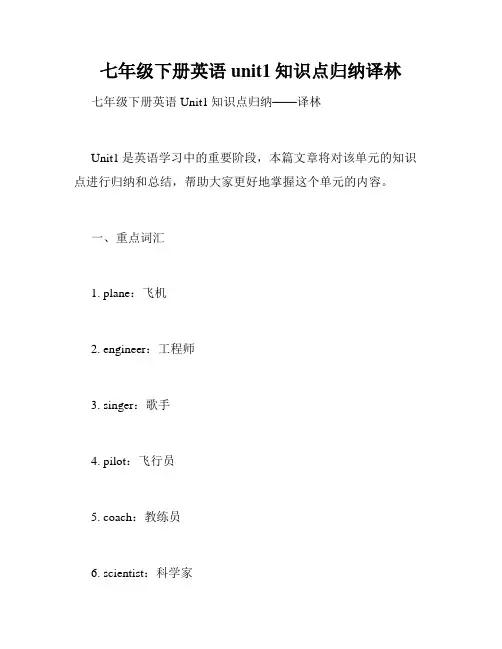
七年级下册英语unit1知识点归纳译林七年级下册英语Unit1知识点归纳——译林Unit1是英语学习中的重要阶段,本篇文章将对该单元的知识点进行归纳和总结,帮助大家更好地掌握这个单元的内容。
一、重点词汇1. plane:飞机2. engineer:工程师3. singer:歌手4. pilot:飞行员5. coach:教练员6. scientist:科学家7. basketball player:篮球运动员8. fireman:消防员9. businessman:商人10. lawyer:律师二、重点句型1. What does he/she do?:他/她是干什么的?2. What do you want to be when you grow up?:长大后你想成为什么?3. I want to be a/an…:我想成为一个……4. She/he is a/an…:她/他是一个……5. Why do you want to be a/an…?:为什么你想成为一个……三、语法重点1. 一般现在时一般现在时常用于表达客观事实、经常性的动作或状态。
例如:My father is a doctor.(我的父亲是一名医生。
)2. 疑问句和否定句疑问句和否定句构成方式:1)疑问句:+ do/does + 主语 + 动词原形.例如:Do you like basketball?(你喜欢篮球吗?)2)否定句:主语 + do/does + not + 动词原形.例如:I do not like swimming.(我不喜欢游泳。
)四、练习题1. What does your mother do?2. What do you want to be when you grow up?3. She is a famous singer.(改成一般疑问句并用肯定回答。
)4. I do not like playing football.(改成肯定句。
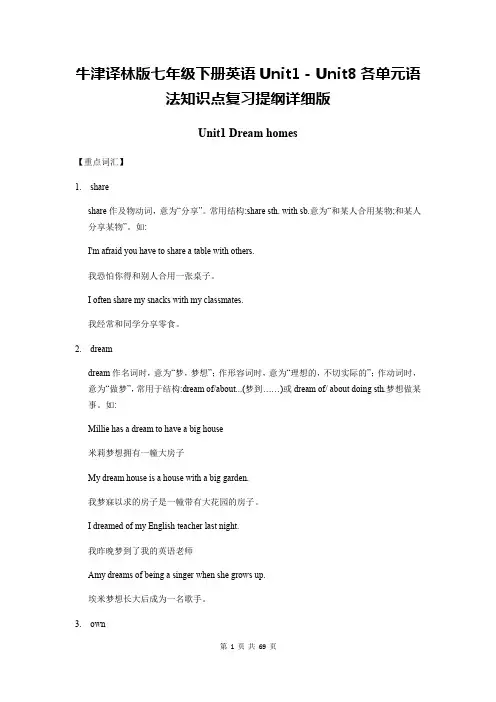
牛津译林版七年级下册英语Unit1-Unit8各单元语法知识点复习提纲详细版Unit1 Dream homes【重点词汇】1. shareshare作及物动词,意为“分享”。
常用结构:share sth. with sb.意为“和某人合用某物;和某人分享某物”。
如:I'm afraid you have to share a table with others.我恐怕你得和别人合用一张桌子。
I often share my snacks with my classmates.我经常和同学分享零食。
2. dreamdream作名词时,意为“梦,梦想”;作形容词时,意为“理想的,不切实际的”;作动词时,意为“做梦”,常用于结构:dream of/about...(梦到……)或dream of/ about doing sth.梦想做某事。
如:Millie has a dream to have a big house米莉梦想拥有一幢大房子My dream house is a house with a big garden.我梦寐以求的房子是一幢带有大花园的房子。
I dreamed of my English teacher last night.我昨晚梦到了我的英语老师Amy dreams of being a singer when she grows up.埃米梦想长大后成为一名歌手。
3. ownown作形容词.意为“自己的,属于自己的”,常和形容词性物主代词连用,构成短语of one's own,表示“属于某人自己的”,on one's own = alone,意为“独自地”。
own作动词时,表示“拥有”。
如:I have my own computer我有属于我自己的电脑。
That's a car of her own.那是她自己的汽车。
He lives on his own.他一个人生活。
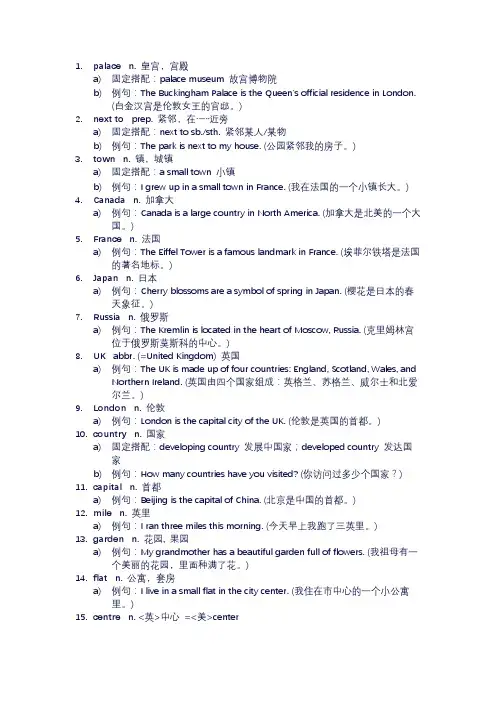
1.palace n. 皇宫,宫殿a)固定搭配:palace museum 故宫博物院b)例句:The Buckingham Palace is the Queen's official residence in London.(白金汉宫是伦敦女王的官邸。
)2.next to prep. 紧邻,在……近旁a)固定搭配:next to sb./sth. 紧邻某人/某物b)例句:The park is next to my house. (公园紧邻我的房子。
)3.town n. 镇,城镇a)固定搭配:a small town 小镇b)例句:I grew up in a small town in France. (我在法国的一个小镇长大。
)4.Canada n. 加拿大a)例句:Canada is a large country in North America. (加拿大是北美的一个大国。
)5.France n. 法国a)例句:The Eiffel Tower is a famous landmark in France. (埃菲尔铁塔是法国的著名地标。
)6.Japan n. 日本a)例句:Cherry blossoms are a symbol of spring in Japan. (樱花是日本的春天象征。
)7.Russia n. 俄罗斯a)例句:The Kremlin is located in the heart of Moscow, Russia. (克里姆林宫位于俄罗斯莫斯科的中心。
) abbr. (=United Kingdom) 英国a)例句:The UK is made up of four countries: England, Scotland, Wales, andNorthern Ireland. (英国由四个国家组成:英格兰、苏格兰、威尔士和北爱尔兰。
)9.London n. 伦敦a)例句:London is the capital city of the UK. (伦敦是英国的首都。
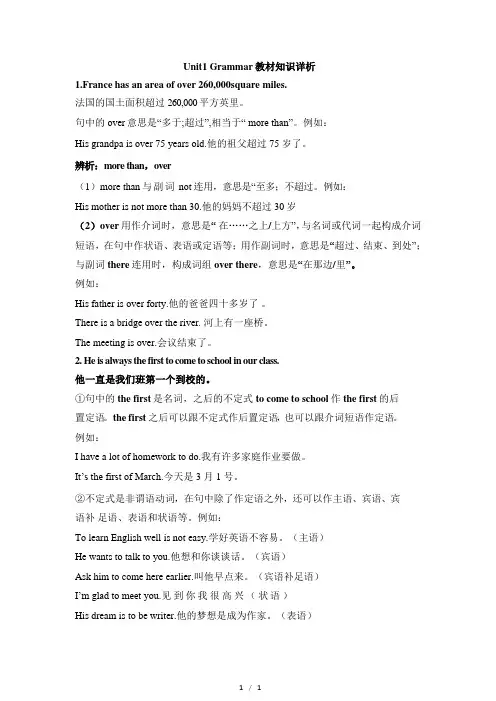
Unit1 Grammar教材知识详析1.France has an area of over 260,000square miles.法国的国土面积超过260,000平方英里。
句中的over意思是“多于;超过”,相当于“ more than”。
例如:His grandpa is over 75 years old.他的祖父超过 75 岁了。
辨析:more than,over(1)more than与副词not连用,意思是“至多;不超过。
例如:His mother is not more than 30.他的妈妈不超过30岁(2)over用作介词时,意思是“在……之上/上方”,与名词或代词一起构成介词短语,在句中作状语、表语或定语等;用作副词时,意思是“超过、结束、到处”;与副词there连用时,构成词组over there,意思是“在那边/里”。
例如:His father is over forty.他的爸爸四十多岁了。
There is a bridge over the river. 河上有一座桥。
The meeting is over.会议结束了。
2. He is always the first to come to school in our class.他一直是我们班第一个到校的。
①句中的the first是名词,之后的不定式to come to school作the first的后置定语。
the first之后可以跟不定式作后置定语,也可以跟介词短语作定语。
例如:I have a lot of homework to do.我有许多家庭作业要做。
It’s the first of March.今天是 3 月 1 号。
②不定式是非谓语动词,在句中除了作定语之外,还可以作主语、宾语、宾语补足语、表语和状语等。
例如:To learn English well is not easy.学好英语不容易。
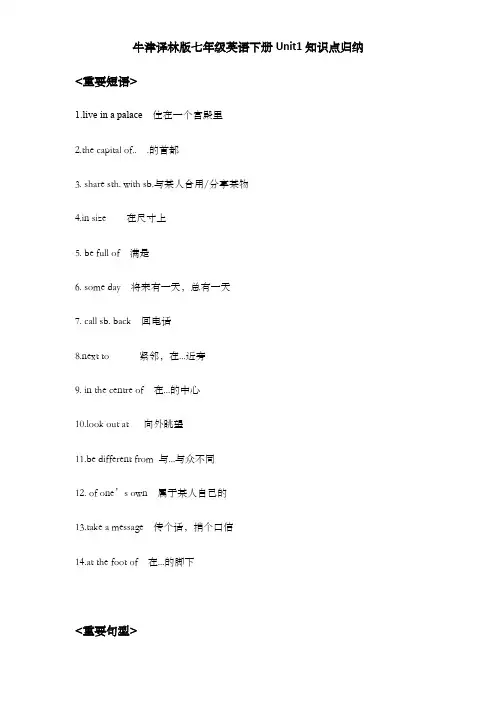
牛津译林版七年级英语下册Unit1知识点归纳<重要短语>1.live in a palace 住在一个宫殿里2.the capital of.. .的首都3. share sth. with sb.与某人合用/分享某物4.in size 在尺寸上5. be full of 满是6. some day 将来有一天,总有一天7. call sb. back 回电话8.next to 紧邻,在...近旁9. in the centre of 在...的中心10.look out at 向外眺望11.be different from 与...与众不同12. of one’s own 属于某人自己的13.take a message 传个话,捎个口信14.at the foot of 在...的脚下<重要句型>1.--Would you like to live in a palace, Eddie?埃迪,你想住宫殿吗?--No. I’d like to live ne xt to a restaurant.不。
我想住在饭店旁边。
2.Is Tokyo the capital of Japan ?东京是日本的首都吗?3.I always have fun with my dog there.我总是和我的狗在那里玩得很开心。
4.I share a bedroom with my sister.我和妹妹同住一间卧室。
5.I love to sit there and look out at the beach and the sea. 我喜欢坐在那儿,向外眺望海滩和大海。
6.Hello. May I speak to Daniel, please?您好。
我可以和丹尼尔通电话吗?7.--Who is speaking, please? 请问你是谁?--This is Simon. 我是西蒙。
七下英语书译林版u1 笔记英文回答:Unit 1: Welcome to Our World.Lesson 1: Getting to Know Each Other.Vocabulary: Greetings, names, nationalities, jobs, hobbies.Grammar: Present simple tense.Dialogue: Introducing yourself and others.Lesson 2: What Makes Us Unique?Vocabulary: Personality traits, physical appearance, likes and dislikes.Grammar: Present simple tense (negative andinterrogative forms)。
Dialogue: Describing a person.Lesson 3: Where in the World?Vocabulary: Countries, continents, cities, geographical features.Grammar: Prepositions of place.Dialogue: Talking about where you live.Lesson 4: All About Me.Vocabulary: Personal information, daily routine, family and friends.Grammar: Present simple tense (frequency adverbs)。
Dialogue: Telling a story about yourself.Lesson 5: Our Planet, Our Home.Vocabulary: Environmental issues, climate change, conservation.Grammar: Past simple tense.Dialogue: Discussing environmental problems.Lesson 6: Explore the World.Vocabulary: Travel destinations, transportation, activities.Grammar: Future simple tense.Dialogue: Planning a trip.中文回答:第一单元,欢迎来到我们的世界。
Unit1Dream homes1、Would you like to live in a palace, Eddie艾迪,你想住在宫殿里吗这里 would like是“想,想要”的意思,后面可以加名词或动词或动词不定式。
如:I’d like to go to the USA next year. 明年我想去美国。
2、I’d like to live next to a restaurant. 我想住在餐馆附近。
这里next to 是“附近,靠近的”的意思,相当于near。
如:The table is next to the window. 这张桌子在窗户旁。
3、Which country is this photo from, Amy艾米,这幅照片来自哪个国家这里be from 相当于come from, 是“来自……”的意思。
如:Where is Mr Black from 布莱克先生来自于哪儿4、Is Tokyo the capital of Japan东京是日本的首都吗句型结构为:The capital of +国家is +首都。
如:The capital of the UK is London. 英国首都是伦敦。
[拓展](1)capital n.省会The capital of Jiangsu is Nanjing. 江苏省会是南京。
(2)capital n.大写字母We should write in a capital at the beginning of a sentence. 句子的开头我们应该用大写字母。
(3)capital n.资本,资金,资产personal capital 个人资产(4)capital adj.顶好的,一流的He came up with a capital idea. 他想好一个绝妙的主意。
5、I like the kitchen best. 我最喜欢厨房。
七年级下册英语译林版第一单元task笔记以下是七年级下册英语译林版第一单元task的笔记:
1. 描述人物外貌特征:
tall 高的
short 矮的
thin 瘦的
heavy 胖的
medium height 中等身高
curly/wavy hair 卷曲/波浪发
straight hair 直发
round face 圆脸
square face 方脸
big eyes 大眼睛
small eyes 小眼睛
high nose 高鼻梁
big mouth 大嘴巴
small mouth 小嘴巴
2. 描述人物性格特征:
outgoing 外向的
quiet 内向的
friendly 友好的
serious 严肃的
shy 害羞的
confident 自信的
humorous 幽默的
kind 和蔼的
3. 描述人物兴趣爱好:
playing basketball 打篮球
listening to music 听音乐
reading books 阅读书籍
watching TV 看电视
playing computer games 玩电脑游戏
4. 其他常用表达:
be good at 擅长于
enjoy doing sth 喜欢做某事
like to do sth/like doing sth 喜欢做某事
dislike to do sth/dislike doing sth 不喜欢做某事
can/cannot stand to do sth/doing sth 不能忍受做某事/做某事。
Unit 1 Dream homesReading重点单词1. mile n. 英里It’s less than a mile from here to the train station.从这儿到火车站不到一英里。
mile 是可数名词,复数miles。
A journey of a thousand miles begins with a single step.千里之行,始于足下。
2. garden n. 花园,果园Mary’s father is watering flowers in the garden.拓展:garden v. 从事园艺活动联想:gardener n. 园丁,园林工人3. flat n. 公寓,套房She wants to buy a flat close to her office.她想买一套离她的办公室近的公寓。
注意:flat多用于英式英语中,apartment多用于美式英语。
拓展:flat adj. 平坦的;扁平的4. centre n. 中心The tree is in the centre of the yard.那棵树在院子中央。
短语:city centre 市中心in the centre of... 在……的中心近义:middle n. 中间;中央拓展:centre n. 核心;焦点;集中地5. share vt. 合用;分享The young couple share the housework.这对年轻夫妇分担家务。
结构:share sth with sb 与某人合用/分享某物谚语:Joy shared with others is more enjoyed.与人同乐,其乐无穷。
6. bedroom n. 卧室Emma is cleaning her bedroom now.7. own adj. 自己的I saw it with my own eyes. 我亲眼看见这件事的。
七年级下册unit1知识点总结译林版七年级下册Unit1知识点总结译林版的七年级下册Unit1是英语教材中的一个重要章节,全章共分为四个小节,主要内容覆盖了第一人称形式、情态动词、一般现在时、指示代词及冠词等方面。
以下是本人对本章节内容的总结与归纳。
一、第一人称形式本小节主要介绍了第一人称这一语法知识,我们可以通过分析一些典型的句子结构来加深对其理解程度。
第一人称形式通常用于表达自己的意见和感受,避免使用第二人称或第三人称,文中给出了几个经典例子,例如"I prefer to watch cartoons"(我喜欢看卡通)这个句子中的I就是代表了第一人称的形式。
二、情态动词情态动词是英语语法中的一类词汇,通常用来表示一种情感色彩的意思,如can、could、may、might、shall、should、will、would等。
这一小节教学中以can和could为例,以"May I use yourpen?"为例子阐述了如何使用情态动词来表示请求以及如何进行肯定和否定回答。
三、一般现在时在学习英语时,一般现在时是我们最为基础的语法知识之一。
本小节很好的介绍了什么是一般现在时,在日常生活中我们也可以借鉴和使用其中的一些表述方法,例如"I usually swim on Saturday morning"(我通常在周六早上游泳),这个句子就很好的运用了一般现在时的时态结构。
四、指示代词及冠词本小节主要介绍了指示代词和冠词这两类英语语法中比较复杂的语法结构与使用方法,例如the、a、an、this、that等,这些词语常常被用来区分物品的不同类别和范围。
在文章中,老师们也很好地为我们解释了这些语法结构的使用方法和注意事项,让我们能够更好地理解和运用这些知识点。
总之,七年级下册Unit1是英语教材中的重要一章,它的涉及范围也比较广泛,在我们的英语学习之路上,这些知识点也是其中常见和基础的一部分。
七年级下册英语译林版知识点unit1 Unit 1:Meeting New Friends
七年级下册英语译林版知识点
本单元主要讲述如何认识新朋友,介绍和询问他们的基本信息以及简单的问候语。
在学习过程中,不仅能提高英语口语表达能力,还能够帮助理解英语中的常用表达。
一、认识新朋友
1. Hey, I’m… 嘿,我是…
2. Nice to meet you. 很高兴见到你。
3. What’s your name? 你叫什么名字?
4. My name is… 我的名字是…
5. Where are you from? 你来自哪里?
6. I’m from… 我来自…
二、介绍自己
1. I’m in Grade Seven. 我在七年级。
2. I’m twelve years old. 我十二岁。
3. I like… 我喜欢…
4. My hobby is… 我的爱好是…
5. I can speak… 我会说…
6. I want to be… 我想要成为…
三、问候语
1. How are you? 你好吗?
2. I’m fine, thank you. 我很好,谢谢。
3. How’s it going? 近来如何?
4. Not bad. 不错。
5. Good morning/afternoon/evening. 早上/下午/晚上好。
四、练习
1. Dialogue 1
A: Hey, I’m Sarah. What’s your name?
B: Hi, I’m Jack. Nice to meet you.
A: Nice to meet you, too. Where are you from? B: I’m from Canada. How about you?
A: I’m from the United States.
B: What’s your hobby?
A: I like playing tennis. How about you?
B: I like dancing.
2. Dialogue 2
A: How are you, Karen?
B: I’m fine, thank you. And you?
A: I’m doing pretty well. How’s schoo l going?
B: It’s going all right. How about you?
A: Same here. Anyway, I’ve got to go now. See you later.
B: See you.
以上是本单元的知识点概括,通过学习这些基础知识,可以轻松地认识新朋友并与他们进行简单的交谈。
最后,希望大家能够在学习英语的过程中不断提高自己的口语表达能力,更好地应对实际生活中的各种场景。